Think in the Morning thanks Lindell Stacy-Horton for her contribution to this post.
He who would do good to another must do it in Minute Particulars.
General Good is the plea of the scoundrel, hypocrite, and flatterer;
William Blake, Jerusalem The Emanation of the Giant Albion
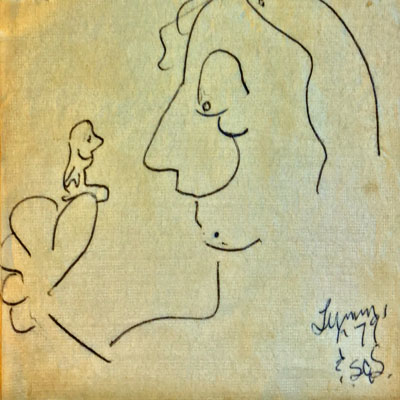
Sea Gull Cellar Bar Napkin Art, artist Lynn
My father was nearly fifty when I was born. Less than two years later my parents separated. I lived with my mother. While I believed my father loved and cared about me, I saw him only occasionally, once or twice a year. We had a good relationship, if distant, thanks to my mother. In spite of many hardships, she never complained and she always spoke highly of my father and did what she could to get us together.
My father died when I was twenty-three. One of the few personal items he left to me was the ring he wore on his right hand, a diamond set in gold with matching rubies on either side. Family history has it that he won the diamond in a card game and had the rubies added later. My half-sister, twice my age, placed the ring on my finger after the funeral saying my father wanted me to have it, to wear it.
I loved my father and was honored to have his ring, but I felt uncomfortable and conspicuous wearing something so valuable especially at such a young age. Shortly after I moved to Mendocino and became the owner of the Sea Gull Restaurant, I removed the ring from my hand.
“So everything lets us down, including curiosity and honesty and what we love best. Yes, said the voice, but cheer up, it’s fun in the end.” Roberto Bolaño, 2666: A Novel

Sea Gull Cellar Bar Nakin Art, artist James Maxwell
The sensible thing to have done would have been to store the ring in a bank safety deposit box, but for some reason I wanted to have the ring near me. I suppose I felt the presence of the ring made me closer to my father, something I’d yearned for all my life. I was loath to part with it. I was very busy at the time. I decided to slip the ring into an empty plastic box that once held a cassette tape. I shoved the box to the rear of a drawer in my desk thinking it would be safe there.
Three years passed quickly. I grew into the demanding job of running the Sea Gull. I forgot about the ring. And then came the kind of surprise that shocks the routine of an ordinary life. A fire rose up from the Cellar Bar and completely destroyed the restaurant.
The fear and panic when I discovered the fire were palpable. I lived next to the restaurant. Everything had to be quickly evacuated from the house in case it too caught fire. That day passed, and then another until months turned into years. The restaurant was rebuilt. Three years later, I moved to a home in the woods with my growing family. Life went on.
Occasionally I thought of my father’s ring. I could not remember where I’d put it. I searched and searched in vain. Finally I assumed it had somehow been lost on that hectic day when the fire consumed everything. I suppose I drew some kind of moral out of that, though I’m not sure what it might have been.
Now that you have this background, I can tell you about Lindell.
“You don’t see any more real honest people unless you go way out in the country.” Flannery O’Connor, Good Country People
I first met Lindell sometime in the early 80s. My wife and I were both working full time, our two young boys were in preschool, and we had our hands full. We needed someone to clean the house. It felt like we were falling behind with everything we had to do. Luckily, we met Lindell.
She was really pleasant and likable and we trusted her. Lindell had recently arrived in Mendocino in her VW bug with all her possessions and was adjusting to life on the coast. As a musician, she quickly connected to the music community. She needed a part time job with flexible hours so that she could concentrate on the things that brought her to Mendocino, music and friends. It was a perfect fit for both of us.
I’ll let Lindell tell you her part of the story:
I came to Mendocino some time in the early ’80s and found a wonderful life in what I have always considered Paradise. I had visited Mendocino in the 60’s, on a three-day field trip with an art class I was taking. As soon as we got out of the bus and looked around, there at the headlands right at the edge, where the famous arch is, I said to my friends, “Someday I will live here. This is my place!” They of course laughed, but I remembered through all those years, and when I found myself there, 20 years later, I stayed. In the early ’80s you could actually make it in Mendocino, at least along the coast, Albion to Fort Bragg, but nobody knew me, except Sandy McCullough and Harold Robinson.
My friend Abra Vargas and I were traveling caravan-style, in search of a new place to settle. Each of us had an old VW, mine a bug, hers a van, and she had attended a week-long workshop at Sandy’s. She invited us to stay a few days while we found somewhere to rent. So Abra called Harold, they talked, and discovered his wife, Jane Gardner, and I were both avid chamber music fiends. Harold eventually rented me Jane’s Music House, a charming cabin on the land, in the forest. Until that happened, I lived in my car, took showers at the local park, and picked up aluminum cans, which I redeemed for a nickel apiece at the Safeway, in Ft. Bragg.
I got a job at Heritage House as soon as it opened after the winter holidays, which helped enormously to augment my “income.” One of my violinist friends Mary Schiro, invited me to play quartets with her, Jane and Tony Miksak, and it was wonderful. Soon she hired me to clean her house, paying me way more than the going rate at the time, just so I could stay and thrive . I lived in a series of cabins, and found a great friend in Jean Spetrino, a good buddy of Jane’s, and considered to be the absolute Queen of Cleaning Ladies of the North Coast. She became too busy, too many clients, and recommended me to David Jones. He was living in a gorgeous three-story redwood and glass palace, with two small very busy boy children and a hard-working wife who taught school, and they indeed needed more help than Jean could provide. She recommended me to David, and he gave me, a stranger new to the area, the chance I needed to become at least a Princess of Cleaning Ladies of the North Coast.

Sea Gull Cellar Bar Napkin Art, artist KR
The first day I came to the house, David showed me around, I was overwhelmed, and said to myself, there is plenty of work here, for sure! He explained what they expected, and one of the first tasks he had me do was to sort through a large cardboard box full of cassette tapes and other oddments. (I realized he wanted to “supervise” me, but had work to do in his office, which was right off the living room through an open doorway.) So, I got to work, sorting tapes. One anonymous box was slightly heavier than the others, and rattled when I picked it up. So I opened it to see what it was, and found The Ring. I have been Around the Block several times, I was “raised right” and I knew exactly what this ring was. I immediately interrupted David, asking him to hold out his hand and close his eyes. Puzzled, he humored me, and I placed the ring in his out-stretched palm. He was stunned, I think, at my honesty in not just pocketing it and living happily ever after. As he told me the story of the Ring, I realized this was not something he talked about with his numerous other employees. I think many cleaning ladies before me have proved less than honest about Other People’s Belongings, but not me. No question. He was stunned, and I was IN. As in, THAT, I believe, was my “audition,” and I passed. He was generous and paid me what Jean had been getting, and I was not expecting that.
The house was indeed a huge job, I worked two days a week, full days, and took a lunch break and two short breaks mid-morning and mid-afternoon. I became a part of this family. During these rests, I took great delight, with permission, of course, in playing records from his enormous Musical Heritage Society collection. And since I was left on my own, I could turn up the sound as loud as I pleased. I explored composers I had only heard about, Scriabin’s orchestral and chamber works, Mahler, Berlioz, and numerous others not heard on even the classical station in San Francisco. Plus the usual Dvorak, Brahms, Beethoven, and the ever-ubiquitous Mozart. After awhile, I became quite expert at understanding these composers’ works, and absolutely loved my time there. David’s wife, Cathy, was an avid gardener, and their whole place was wonderful, especially on summer days when everything was blooming, and I could take my lunch out to the deck, windows open, music floating out. True heaven for me!
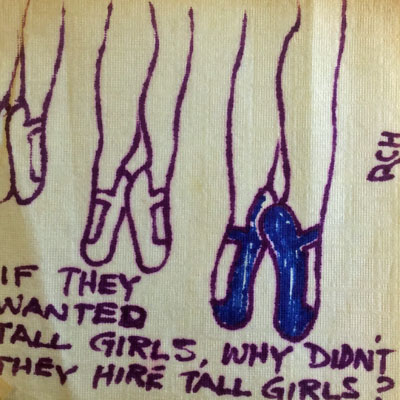
Sea Gull Cellar Bar Napkin Art, artist Roy Hoggard
Lindell was wrong about the “audition.” I knew when I met her, she was right for the job. A test was unnecessary. As for The Ring, it was a total surprise to see it again after all those years. It was The Ring, not Lindell, that surprised me. I have faith in ordinary people to do the right thing. I’ve been called foolish and I’ll be honest, it hurts when that faith is tested as it inevitably is. But mostly, I’ve been rewarded many times over. Cynicism is not in my tool kit. It isn’t naïve to believe that people are basically honest even if they are not always honest.
There is no compelling economic reason to tell the truth or keep one’s word—punishment for the treacherous in the real world is neither swift nor sure … Without values, without a basic preference for right over wrong, trust based on such self-delusion would crumble in the face of temptation.
Amar Bhide and Howard H. Stevenson, Why Be Honest if Honesty Doesn’t Pay, Harvard Business Review
The benefits of honesty seem small at a time like today when dishonesty accomplishes so much in the world of politics. Yet, it is honesty that holds everything together and dishonesty that tears it apart.
“We learned about honesty and integrity – that the truth matters… that you don’t take shortcuts or play by your own set of rules… and success doesn’t count unless you earn it fair and square.” Michelle Obama, Democratic National Convention, 2012
When honesty is replaced by dishonesty on a massive scale, the results are catastrophic. The human brain is no match for a pathological liar. Most people do not wish to be perpetually skeptical, paranoid, cynical, leery, wary, suspicious and mistrustful of those around them. It’s to much work. Our default setting is to assume honesty, to accept the word of others, until we can prove otherwise. Unfortunately, human minds “when faced with shortages of time, energy, or conclusive evidence, may fail to unaccept the ideas that they involuntarily accept.” Given our default position, we are vulnerable. The pathological liar has an advantage.

When we are overwhelmed with false, or potentially false, statements, our brains pretty quickly become so overworked that we stop trying to sift through everything.
Our brains are particularly ill-equipped to deal with lies when they come not singly but in a constant stream.
[If a pathological liar] has a particular untruth he wants to propagate—not just an undifferentiated barrage—he simply states it, over and over. As it turns out, sheer repetition of the same lie can eventually mark it as true in our heads.
Repetition of any kind—even to refute the statement in question—only serves to solidify it. For instance, if you say, “It is not true” … or try to refute the claim with evidence, you often perversely accomplish the opposite of what you want.
In politics, false information has a special power. If false information comports with preexisting beliefs—something that is often true in partisan arguments—attempts to refute it can actually backfire, planting it even more firmly in a person’s mind.
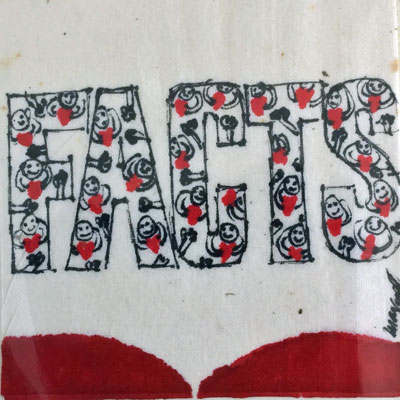
Sea Gull Cellar Bar Napkin Art, artist James Maxwell
It’s devilishly difficult to undermine a lie when it’s properly told. When an inveterate liar knows the tricks to use and is willing to use them with skill on a massive scale, the abnormal becomes normal.
“Lies are exhausting to fight, pernicious in their effects and, perhaps worst of all, almost impossible to correct if their content resonates strongly enough with people’s sense of themselves.” (Konnikova)
So what can we do? We focus on the Minute Particulars. We focus on the return of the ring. That is what Lindell did on that Spring day thirty-five years ago. That is what she reinforced.
AND many conversed on these things as they labour’d at the furrow.
Saying: ‘It is better to prevent misery than to release from misery;
It is better to prevent error than to forgive the criminal.
Labour well the Minute Particulars: attend to the Little Ones;
And those who are in misery cannot remain so long,
If we do but our duty: labour well the teeming Earth …
He who would do good to another must do it in Minute Particulars.
General Good is the plea of the scoundrel, hypocrite, and flatterer;
For Art and Science cannot exist but in minutely organized Particulars,
And not in generalizing Demonstrations of the Rational Power:
The Infinite alone resides in Definite and Determinate Identity.
Establishment of Truth depends on the destruction of Falsehood continually,
On Circumcision, not on Virginity, O Reasoners of Albion!
William Blake, Jerusalem The Emanation of the Giant Albion
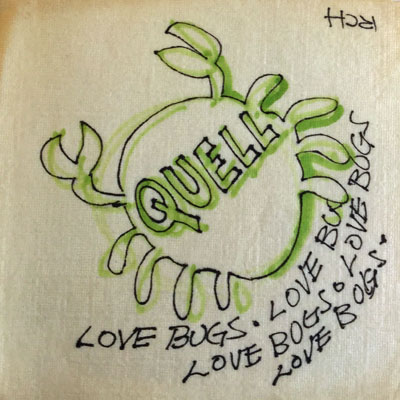
Sea Gull Cellar Bar Napkin Art, artist Roy Hoggard
The recovery of my father’s ring remains vivid in my memory. People are mostly honest, not perfectly honest. Total honesty is unattainable and at times even undesirable.
A truth that’s told with bad intent. Beats all the lies you can invent.
William Blake “Auguries of Innocence”
They are honest enough for the world to work. This is such a common truth that we hardly think about how important and essential it is to our lives until we are confronted with it as I was on the day I met Lindell. We hardly think about how general and widespread dishonesty would stop civilization in its tracks.
The head and the heart are regularly pitted against each other as if a great drama is going on around us. Gary Wills wrote a book with the title Head and Heart: American Christianities. Alan Blinder wrote a book on the economy called Hard Heads, Soft Hearts: Tough Minded Economics for a Just Society. David Hume’s famous line “reason is and ought only to be the slave of the passions” was countered by Pascal’s “the heart has its reasons of which reason knows nothing.” In the real world, the head and the heart work together. This is the key. The General Good will take care of itself if only we listen to the Minute Particulars. “Establishment of truth depends on destruction of falsehood continually, on Circumcision, not on Virginity, O Reasoners of Albion.”
Don’t listen to that other voice, that false voice, that is so loud today. Beware of false promises.
… You say you never compromise
With the mystery tramp, but now you realize
He’s not selling any alibis
As you stare into the vacuum of his eyes
And say do you want to make a deal?
… Ain’t ‘t it hard when you discovered that
He really wasn’t where it’s at
After he took from you everything he could steal
… But you better take your diamond ring, you better pawn it babe
Bob Dylan, Like a Rolling Stone
POSTSCRIPT:
“I’m going to tell you something: thoughts are never honest. Emotions are. Do not go around asking for honesty in what people think; much of what they perceive as thinking is empty anyway because it’s thought out again and again and comes out refined and muddy. The ones who know how to feel might have to say to you a couple of interesting things or not and when they do that, you ought to know how to listen. So learn how to listen. You can’t make someone open up about their feelings in case they don’t want to. But you can remain open yourself through listening deeply and completely; they might want to talk about the weather and keep it simple — allow them to feel the simplicity…Emotion pours out directly or indirectly each time people engage themselves in the process of genuine interaction.” Albert Camus

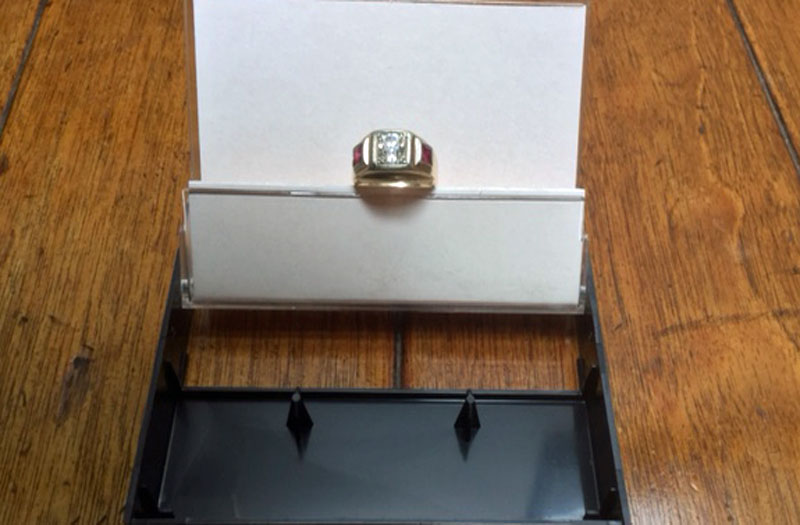
Pretty neat story old man!
Wonderful story young man!
I like your self scrutiny. It is inspiring. I think it stirs up the need to share.
Thanks. And for Dylan . . . it didn’t end there. Did it?
Thanks. No, the lyrics are online. I just picked out a few that fit.
Great story that I not preciously heard from you.
Great story. Lindell and Steve visited a few weeks ago and a few of us got together for music at Tony and Joselyn’s. Lots of memories in this little story. Thought’s of Jane, Harold, Norman, and others out at “the digs.” And, Merlin too, doing magic down in the Mushroom cabin on the rivers edge.
Thanks Jonathan. I always enjoy hearing these local stories.